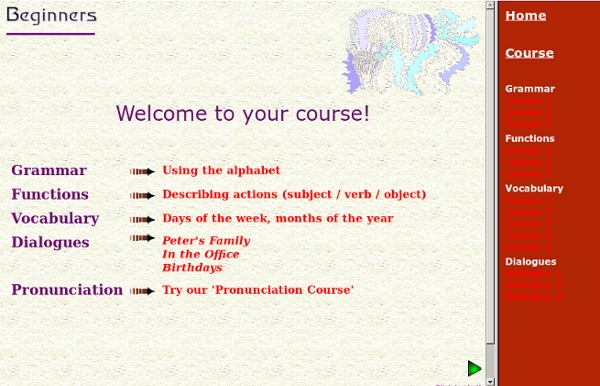



Present Simple & Present Progressive: présent simple et présent progressif ou continu Notes Notez le 's' à la troisième personne du singulier du 'Present Simple'.Avant d'ajouter -ing, il faut doubler la consonne finale si les deux conditions suivantes sont remplies: le verbe se termine par une seule voyelle suivie d'une seule consonne,la dernière syllabe est accentuée, ou il n'y a qu'une syllabe. Pour savoir si la syllabe est accentuée, il faut consulter un dictionnaire. Emploi Present Progressive Le Present Progressive (ou Present Continuous) s'emploie pour parler de: ce qui se passe maintenant: I'm reading a page on the Internet at the moment. Present Simple Le Present Simple s'emploie pour parler de: ce qui est toujours vrai: The sun rises in the east. Le Present Simple est aussi employé pour les verbes d'état, c'est-à-dire les verbes qui font référence à un état mental, émotionnel, etc. Il est à noter pourtant que certains de ces verbes peuvent avoir une signification autre que celle qu'ils ont lorsqu'ils sont considérés comme des verbes d'état. Pratique
autoenglish.org English news and easy articles for students of English Présent simple - What time do you wake up? - I wake up at 9.30 am Principaux emplois : vérités permanentes, actions répétitives/habituelles; sentiments Syntaxe : Ajoutez un -S à la 3ème personne du singulier. Si le verbe se termine par un -y précédé d'une consonne, le -y se change en -ies Exemple (verbe : to wake up / se réveiller): I wake up You wake up He/She/It wakeS up We wake up You wake up They wake up Négation : Utilisez les auxiliaires DON'T ou DOESN'T (3ème forme du singulier) I don't wake up at 9.30 am She doesn't wake up at 9.30 am Le 's' de la 3e personne du singulier vient se greffer à l'auxiliaire DO, pas au verbe. Question : Utilisez DO ou DOES (3ème forme du singulier) Do you wake up at 9.30? Le 's' de la 3e personne du singulier vient se greffer à l'auxiliaire DO, pas au verbe. Réponses : Do you wake up at 9.30 ? EXERCICE: Mettre les verbes au présent simple
Free Online Reading Comprehension Exercises EnglishMaven Free online Reading Comprehension Exercises and Quizzes. We love reading comprehension. We think you do too. After all, it's the most popular subject on English Maven, and a staple educational tool used throughout schools and the internet. However, it is important to note that while they may be popular, not all reading comprehension exercises are created equal. Short Stories In these reading comprehension exercises, students read a short story and then answer questions about details in the story. Exercises by ReadTheory "Time to..." - Low Beginning. 10 questions. 77 words. Informational Passages These exercises are interactive, colorful, unique, and provide interesting information about a range of subjects. "Bees" - Mid Beginning. 10 questions. 200 words.
Page d'accueil de la Bibliothèque numérique mondiale BBC Learning English | Prononciation Conseils PHRAS.IN - Say this or say that? Savoir Insolite & Connaissances en tout genre, des Informations Insolites et expliquées. Listening Welcome to EnglishClub Listening, to help you learn the skill of listening in English. Listening is the first of the four language skills, which are: 1. Listening 2. Speaking 3. What Is Listening? How to Hear English Everywhere How can you hear English when you're not in an English-speaking country? Dictation Do you want to improve your English listening skills? Listen to English by Radio Listen to English online with programmes from stations like the BBC or Voice of America. Listen to the News Listen to our weekly digest of the news in English. Listen to Poetry in English Some classic pieces of poetry and other texts for you to listen to and read. Podcasts You can listen online or download these readings, many of which come with transcript and wordchecker to explain vocabulary. Improve your listening with MyEC! MyEnglishClub features thousands of videos and songs for English learners. This Week in History Listen to a new story every Monday. ESL Videos More listening practice by watching videos.